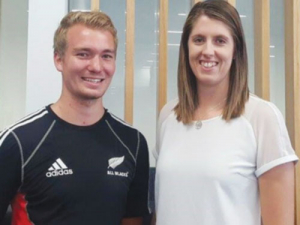Applause has replaced eye rolling as university students launch a scheme to show secondary schoolers the career opportunities in the primary industries.
Waikato University business and science student Jack Keeys says when the Waikato Rabobank Client Council came to talk in one of his courses about their plans the students’ response was only lukewarm.
Rabobank invests money in the community or industry and the council had decided to aim to attract more students into agriculture.
“They visited a class at the University of Waikato which I was in. They said they had this goal and were thinking of making an app,” he says.
“A few of us were saying ‘noooo… I don’t think an app is the best way to go. Students are using apps for Facebook and Snapchat, not for career advice’. So a couple of us applied for some funding to create an alternative idea.”
He and another agri-business student, Alanah Vinson, created the Agri-Leadership Programme with the client council to highlight the many career opportunities in agriculture. The 2017 programme is the second such event since the inaugural one in 2016.
Following an application process last year, 31 year-11 and 12 students from Waikato attended the programme from January 16-19. They stayed on the university campus and took part in an action-packed four-day event.
The Rabobank Waikato Client Council is a group of leading Rabobank clients who meet regularly to identify and discuss the challenges facing the agricultural sector. They develop activities that contribute to a sustainable food and agribusiness industry for future generations.
Keeys was involved in starting the Agri-Leadership programme last year and is the primary coordinator. He says most of the students tend to have a farming background but a few have none.
They are running surveys to see how many students who attend the programme move into primary industry careers. But because it is only the second year, it is too early to tell.
Next year they will get a good picture. Meanwhile they have surveyed what careers students were thinking about before they did the programme, then afterwards.
“We are seeing an increase of 20-30% in those thinking of an agri career path, bringing that to 80-90% who would like a career in the primary industry, whether it be engineering or computing, business or science,” he says.
“Once they realise they can build all these other things they are interested in into primary industries, it is something that gets them excited.”
High-profile industry speakers at last month’s event were Tony Collingwood, Rabobank; Tony Pearse, DINZ; Lain Jager, Zespri; and Ian Proudfoot, KPMG.
Plant tours took in Silver Fern Farms at Te Aroha, LIC, AgResearch, DairyNZ, Yashili, Quality Mushrooms, Farmax, Ravensdown, Gallagher, Oraka Farms and Plant and Food Research.
The guest speakers’ overall themes were important, says Keeys. Notably, Jager spoke about career pathways – choosing the right studies and university.
“That was brilliant for the students because it engaged them personally. Then Ian Proudfoot talked about the future of agribusiness and primary industries and how it might be 20 to 30 years from now and students loved that.”
Keeys himself is taking a business and science degree. He works for Farmax in the holidays and intends to join the company fulltime when he graduates.



















